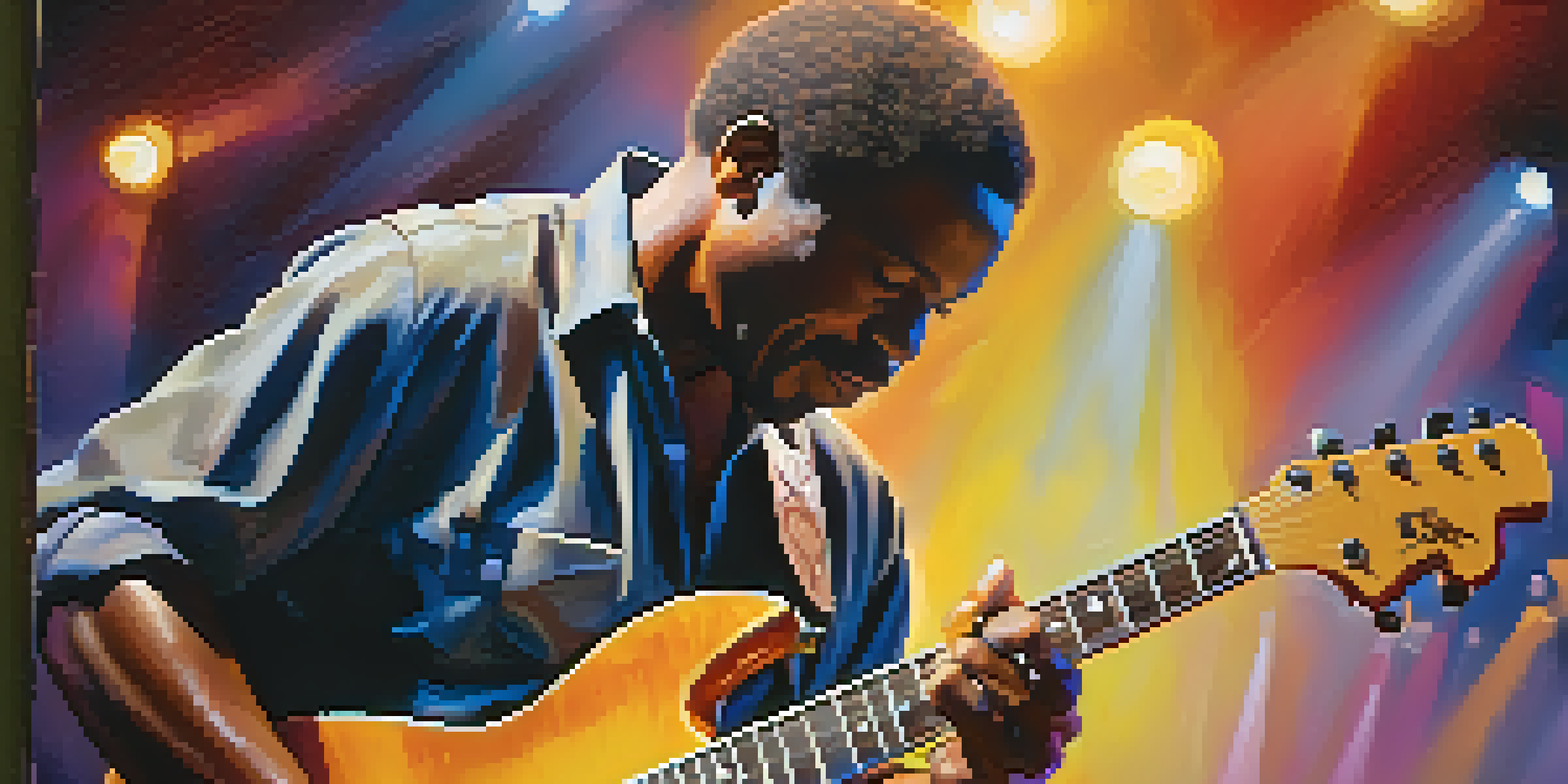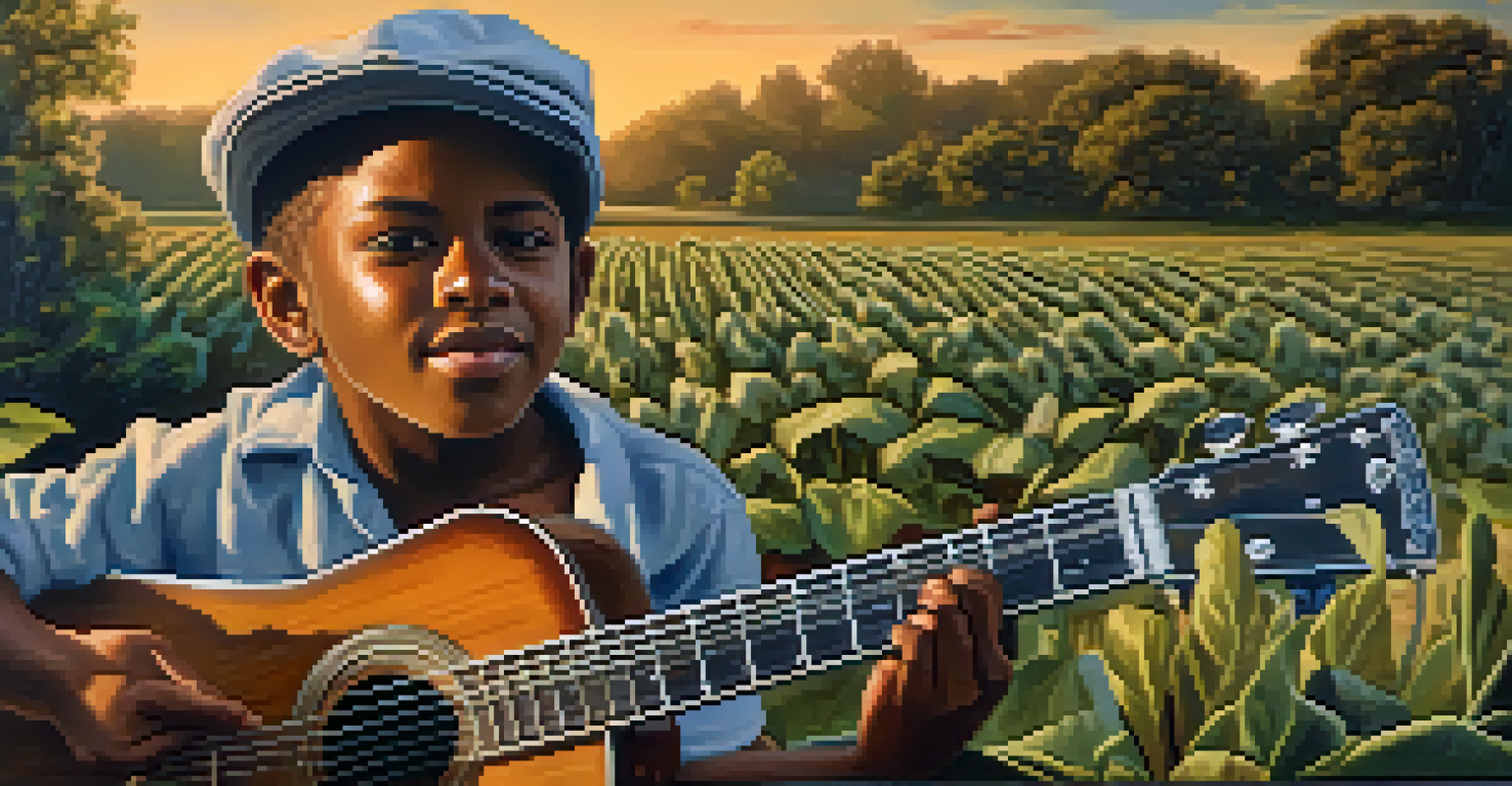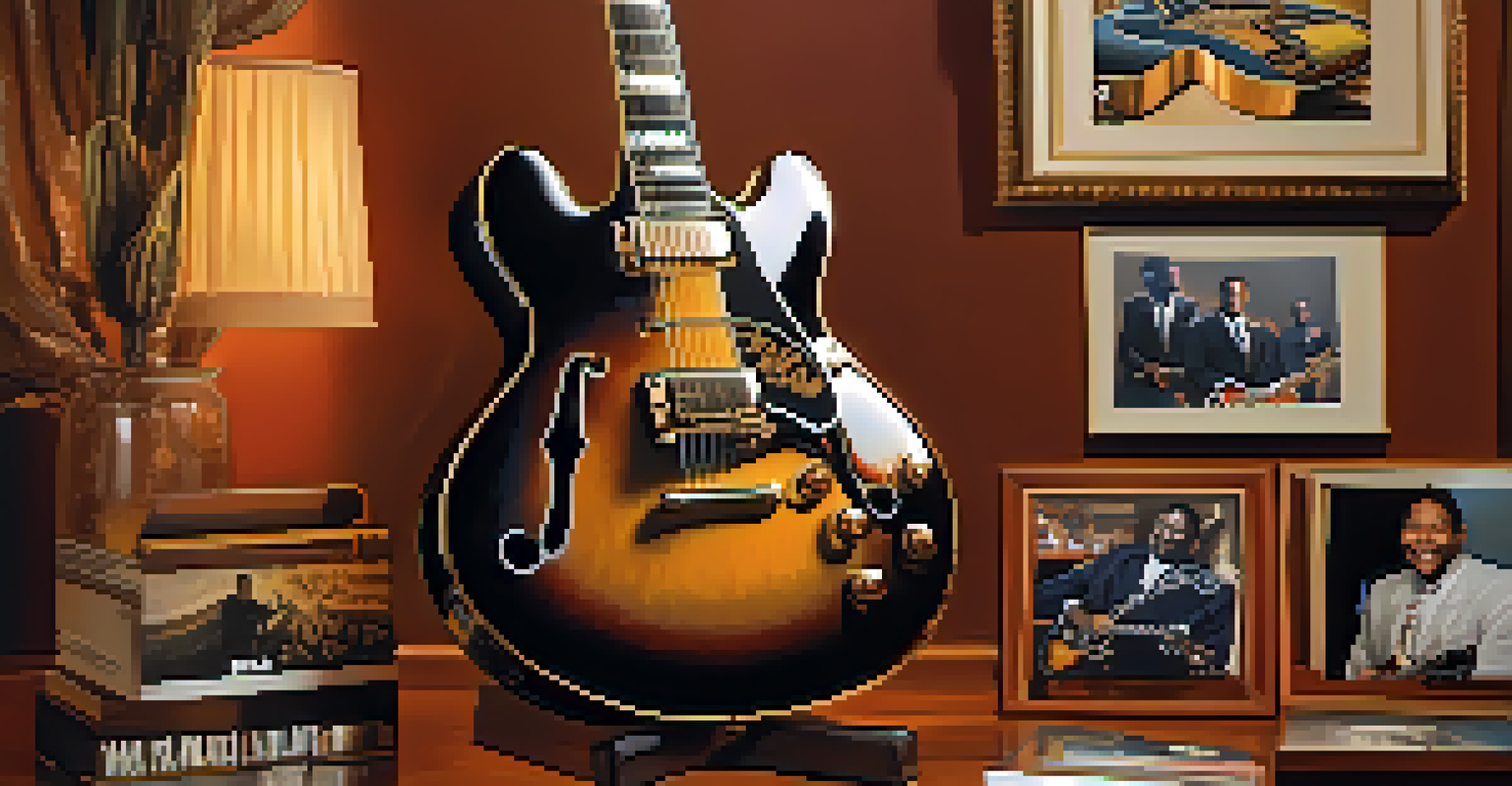The Legacy of B.B. King: A Journey Through Blues Guitar

The Early Years: B.B. King's Musical Roots
B.B. King, born Riley B. King in 1925, grew up in Mississippi, surrounded by the sounds of gospel and Delta blues. His early exposure to music came from church, where he learned the power of emotion in song. These formative years laid the groundwork for his distinctive style, blending heartfelt lyrics with expressive guitar work.
The blues is a source of inspiration for all music. It's the foundation of what we know as rock and roll, and it continues to influence artists across genres.
As a teenager, King began to play guitar, often using a one-string instrument made from a cigar box. This humble beginning didn't deter him; instead, it fueled his passion for music. He would eventually move to Memphis, a city that would become a pivotal influence on his career, allowing him to connect with other musicians and expand his musical horizons.
King's journey from the fields of Mississippi to the bustling streets of Memphis exemplified the migration of many African American musicians during that era. This transition not only shaped his sound but also helped establish the blues as a prominent genre in American music.
The Birth of a Legend: Early Career Highlights
In the late 1940s, B.B. King began recording and performing professionally, quickly gaining recognition. His first major hit, 'Three O'Clock Blues,' released in 1949, showcased his unique blend of heartfelt lyrics and intricate guitar solos. This song not only topped charts but also solidified King's place in the music industry.

As his fame grew, King became known for his engaging performances, often captivating audiences with his expressive playing and storytelling. He was a master at connecting with listeners, making them feel every note he played. This ability to evoke emotion would become a hallmark of his legacy.
B.B. King's Musical Origins
B.B. King's early years in Mississippi, steeped in gospel and Delta blues, profoundly shaped his emotional and expressive music style.
Throughout the 1950s and 1960s, King toured extensively, sharing stages with icons like Ray Charles and The Rolling Stones. These collaborations not only elevated his profile but also helped introduce the blues to a broader audience, ensuring its place in popular music history.
Signature Style: The Lucille Guitar
One of the most iconic aspects of B.B. King's legacy is his beloved guitar, Lucille. Named after a woman he once tried to impress, the guitar symbolizes King's deep connection to his music and his craft. The story behind Lucille adds a layer of personal history that resonates with fans.
I've always said that the blues are the roots, and everything else is the fruits.
King's unique playing style, characterized by his use of vibrato and expressive bends, set him apart from other guitarists. He had a remarkable ability to convey emotion through his instrument, making every note significant. This technique, combined with his smooth voice, created a sound that was distinctly his own.
Over the years, Lucille became more than just a guitar; it became a part of King's identity. His dedication to this instrument inspired countless musicians, solidifying its place in the history of blues guitar and making it synonymous with King's musical legacy.
Cultural Impact: Spreading the Blues
B.B. King's influence extended far beyond his music; he played a crucial role in popularizing the blues genre globally. His efforts to bridge the gap between blues and other musical styles opened doors for future generations of artists. King’s collaborations with rock musicians helped introduce blues elements into mainstream music.
The impact of King's music can be seen in the works of artists across genres, including Eric Clapton, Stevie Ray Vaughan, and even pop stars like John Mayer. Each of these musicians carries a piece of King's legacy, showcasing the timeless quality of his sound and style.
Lucille: More Than a Guitar
King's iconic guitar, Lucille, symbolizes his deep connection to music and showcases his unique playing style that captivated audiences.
Moreover, King was a passionate advocate for the blues, participating in numerous festivals and events dedicated to the genre. His commitment to preserving and promoting blues music ensured its survival and relevance in the ever-evolving landscape of music.
Awards and Recognition: A Celebrated Career
Throughout his illustrious career, B.B. King received numerous accolades, reflecting his profound impact on the music industry. He won 15 Grammy Awards, including a Lifetime Achievement Award, recognizing his contributions to music and culture. These honors not only celebrated his individual talent but also highlighted the importance of blues in American music history.
In addition to his Grammy wins, King was inducted into various halls of fame, including the Rock and Roll Hall of Fame in 1987. These recognitions cemented his status as one of the greatest guitarists of all time, inspiring countless musicians to pursue their passions.
B.B. King’s legacy continues to be celebrated today, with tributes and memorials honoring his life and work. From streets named after him to annual festivals dedicated to his music, King's influence remains a vital part of the cultural landscape.
Teaching and Mentorship: Passing the Torch
B.B. King was not only a performer but also a mentor to many aspiring musicians. He understood the importance of nurturing talent and often took younger artists under his wing. His willingness to share knowledge and experience helped cultivate a new generation of blues musicians.
King's approach to teaching was rooted in his own experiences; he emphasized authenticity and the emotional connection in music. He encouraged his protégés to find their unique voices while respecting the rich traditions of the blues. This philosophy ensured the genre's evolution while honoring its roots.
Legacy of Mentorship and Influence
Beyond his performances, B.B. King inspired countless musicians through mentorship, ensuring the evolution and preservation of the blues genre.
Through workshops, masterclasses, and personal guidance, King inspired many to pursue their passion for music. His legacy as a mentor is a testament to his commitment to the blues and his desire to see it thrive for years to come.
The Enduring Legacy of B.B. King
B.B. King's influence on music is undeniable and continues to resonate with musicians and fans alike. His innovative guitar techniques and soulful performances have left an indelible mark on the blues genre and beyond. King's ability to convey deep emotion through his music ensures that his legacy will live on.
As we reflect on his contributions, it's clear that King wasn't just a musician; he was a cultural icon who helped shape the sound of modern music. His songs and style continue to inspire artists, reminding us of the power of storytelling through music.

In essence, B.B. King's legacy is a celebration of the blues—its history, its evolution, and its future. By honoring his memory, we keep the spirit of the blues alive, ensuring that new generations continue to feel the magic of his music.